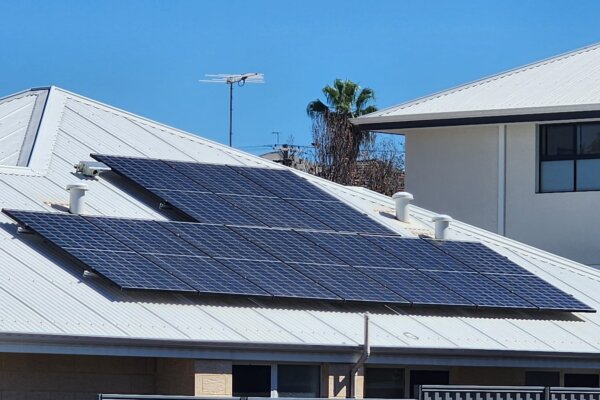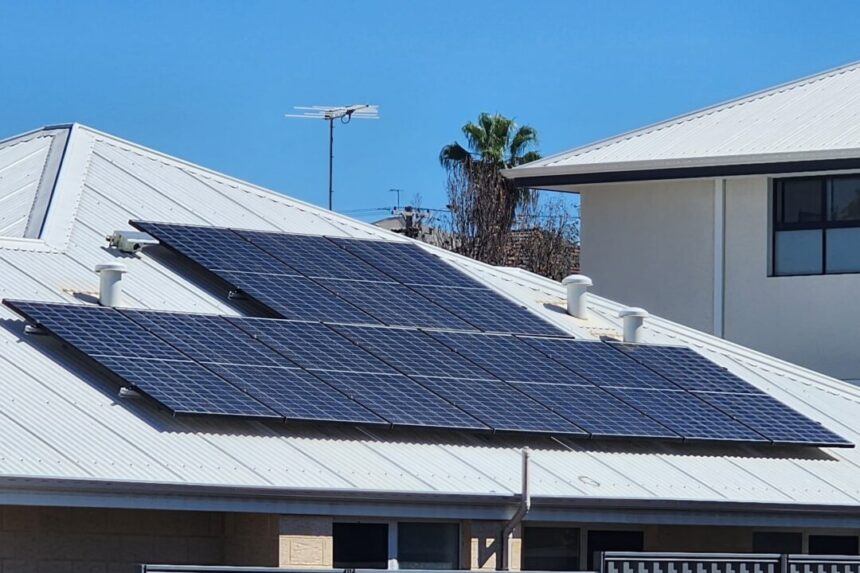
Liberal Senator Matt Canavan is questioning why Chinese solar panels are not banned in Australia.
The Albanese government has announced $1 billion (US$652 million) into a solar manufacturing hub at a former coal site.
The taxpayer funds will be dedicated to supporting solar manufacturing via production subsidies and grants.
The announcement is part of the Labor government’s plan to become a “renewable energy superpower” in Australia and overseas.
Labor is aiming to ensure solar panels are manufactured in Australia, including in the Hunter region at the old coal-fired Liddle Power station.
Touting the initiative, the government noted only 1 percent of solar panels used in Australian households are made on home soil.
Prime Minister Anthony Albanese said Australia should not merely serve as the final link in a global supply chain, for an Australian invention.
“We have every metal and critical mineral necessary to be a central player in the net zero transformation, and a proven track record as a reliable energy producer and exporter.”
Climate Change and Energy Minister Chris Bowen added, “Australian research helped invent the modern solar panel—today’s announcement is about creating Australian jobs to help manufacture them.”
“We know that the world’s climate emergency is Australia’s jobs opportunity, $1 billion to support Australian manufacturing in solar technology will help seize that opportunity.”
The $1 billion federal investment adds to a $40 billion outlay by the Federal government to “make Australia a renewable energy superpower.”
“Historically, Australia has been good at going from the mining pit to port, and long may this continue. But the Australian government will also invest in the path from pit to panels and capture more value for our economy and workforce,” Mr. Albanese said.
Liberal National Party Senator Calls for Ban on Chinese Solar Panels
Liberal National Party Senator Matt Canavan called for Australia to ban solar panels made in China on March 28, saying Australian workers would not be able to compete with “slave labour.”
“There is no chance that Australian workers can compete with slave labour. So if we want a domestic manufacturing industry we have to ban the importation of slave labour-made products.”
Avalanche of Renewable Energy Announcements
The $1 billion solar spend announced on March 28 follows the Albanese government introducing two climate-related bills into the parliament on March 27.
Further, the government introduced laws that will mandate climate reporting from January 2025.
“Our changes will establish Australia’s climate risk disclosure framework, giving investors and companies the transparency, clarity, and certainty they need to invest in new opportunities as part of the net zero transformation,” Treasurer Jim Chalmers said.
“Zero-emissions nuclear energy is a proven source of clean, reliable, and low-cost energy used all around the world,” Shadow Minister for Climate Change and Energy Ted O’Brien said on March 26.
“The Albanese Labor government refuses to even have a mature conversation about the role next-generation nuclear could play in cleaning up Australia’s grid.”
Solar Project Will Complement State Net Zero Plan
To The Albanese government said the $275 million New South Wales (NSW) net zero manufacturing initiative will run in tandem with the solar program.
The first round of the NSW project is already open for businesses, manufacturers, and innovators to apply.
Minister for Climate Change and Energy Minister Penny Sharpe said it was great to align NSW and Commonwealth funding to support clean energy manufacturing.
She noted the fund will bolster the government’s $275 million investment in net zero manufacturing that is open for innovators and businesses in the state.
“This will see NSW households putting NSW-made solar panels on their roofs to deliver long-term energy bill savings and a strong domestic renewable manufacturing sector,” Ms. Sharpe said.
Commenting on the plan, NSW Minister for Domestic Manufacturing Courtney Houssos said the government is committed to rebuilding the domestic manufacturing sector and bringing jobs back to NSW.
“We will leverage our government procurement spend to build in offtake agreements with local solar manufacturers and foster the industry’s growth,” she said.





